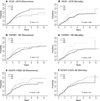Angiogenesis-associated sequence variants relative to breast cancer recurrence and survival
- PMID: 20571871
- PMCID: PMC5046825
- DOI: 10.1007/s10552-010-9583-9
Angiogenesis-associated sequence variants relative to breast cancer recurrence and survival
Abstract
Introduction: Breast cancer (BrCA) risk stratification using clinico-pathological biomarkers helps improve disease prognosis prediction. However, disease recurrence rates remain unfavorable and individualized clinical management strategies are needed. Consequently, we evaluated the influence of 14 sequence variants detected in IL-10, TGF-β1, VEGF, and their associated receptors as effective predictors of BrCA clinical outcomes.
Methods: Tumor DNA samples collected from 441 BrCA patients were genotyped using TaqMan-PCR. Most selected targets alter cytokine serum/plasma levels or signaling pathways. Relationships between genetic profiles and recurrence as well as disease-related mortality were evaluated using cumulative incidence curves and competing risk regression models.
Results: The VEGF(-2578)C allele was associated with a 1.3- to 1.6-fold increase in BrCA recurrence (HR(trend) = 1.28; 95% CI = 0.96-1.72) and disease-related mortality (HR(trend) = 1.56; 95% CI = 0.93-2.56). Although this marker was marginally significant relative to BrCA outcomes, there were substantial gains in the 5- and 8-year predictive accuracy compared to standard prognostic indicators. Among ER(+)/PR(+) status patients, there was a significant impact of the VEGF(-2578)CC genotype on disease recurrence and predictive accuracy.
Conclusions: Our findings suggest inheritance of the VEGF(-2578)C allele could serve as an independent prognostic indicator of BrCA prognosis. The VEGF(-2578) marker may have clinical implications among a subset of ER(+)/PR(+) patients with an aggressive phenotype. Because the VEGF(-2578)C allele is linked to high VEGF expression, this cytokine is a potential prognostic and targeted clinical management tool.
Figures
Similar articles
-
Molecular biomarkers for prediction of response to treatment and survival in triple negative breast cancer patients from Egypt.Exp Mol Pathol. 2015 Oct;99(2):303-11. doi: 10.1016/j.yexmp.2015.07.014. Epub 2015 Jul 30. Exp Mol Pathol. 2015. PMID: 26232605
-
Associations of angiogenesis-related proteins with specific prognostic factors, breast cancer subtypes and survival outcome in early-stage breast cancer patients. A Hellenic Cooperative Oncology Group (HeCOG) trial.PLoS One. 2018 Jul 31;13(7):e0200302. doi: 10.1371/journal.pone.0200302. eCollection 2018. PLoS One. 2018. PMID: 30063723 Free PMC article. Clinical Trial.
-
Prognostic significance of vascular endothelial growth factor protein in node-negative breast carcinoma.J Natl Cancer Inst. 1997 Jan 15;89(2):139-47. doi: 10.1093/jnci/89.2.139. J Natl Cancer Inst. 1997. PMID: 8998183
-
Eukaryotic initiation factor 4E (eIF4E) and angiogenesis: prognostic markers for breast cancer.BMC Cancer. 2006 Sep 30;6:231. doi: 10.1186/1471-2407-6-231. BMC Cancer. 2006. PMID: 17010208 Free PMC article.
-
Prognostic and predictive role of vascular endothelial growth factor polymorphisms in breast cancer.Pharmacogenomics. 2015 Jan;16(1):79-94. doi: 10.2217/pgs.14.148. Pharmacogenomics. 2015. PMID: 25560472 Review.
Cited by
-
Prognostic evaluation of VEGFA genotypes and haplotypes in a cohort of Brazilian women with non metastatic breast cancer.Cancer Biol Ther. 2016 Jun 2;17(6):674-83. doi: 10.1080/15384047.2016.1190486. Cancer Biol Ther. 2016. PMID: 27195611 Free PMC article.
-
Association of VEGF haplotypes with breast cancer risk in North-West Indians.BMC Med Genomics. 2021 Aug 24;14(1):209. doi: 10.1186/s12920-021-01060-4. BMC Med Genomics. 2021. PMID: 34429108 Free PMC article.
-
Epidermal growth factor receptor (EGFR) and vascular endothelial growth factor A (VEGF-A) expressions in Ethiopian female breast cancer and their association with histopathologic features.PLoS One. 2024 Oct 15;19(10):e0308411. doi: 10.1371/journal.pone.0308411. eCollection 2024. PLoS One. 2024. PMID: 39405290 Free PMC article.
-
Association of VEGF and VEGFR1 polymorphisms with breast cancer risk in North Indians.Tumour Biol. 2015 Jun;36(6):4223-34. doi: 10.1007/s13277-015-3059-1. Epub 2015 Jan 22. Tumour Biol. 2015. PMID: 25604142
-
Genetic Effects of Vascular Endothelial Growth Factor A (VEGF-A) and Its Association with Disease Progression in Breast Cancer Population of Saudi Arabia.Asian Pac J Cancer Prev. 2020 Jan 1;21(1):139-145. doi: 10.31557/APJCP.2020.21.1.139. Asian Pac J Cancer Prev. 2020. PMID: 31983176 Free PMC article.
References
-
- Wu JM, Bensen-Kennedy D, Miura Y, et al. The effects of interleukin 10 and interferon gamma cytokine gene polymorphisms on survival after autologous bone marrow transplantation for patients with breast cancer. Biol Blood Marrow Transplant. 2005;11(6):455–464. - PubMed
-
- Stearns ME, Fudge K, Garcia F, Wang M. IL-10 inhibition of human prostate PC-3 ML cell metastases in SCID mice: IL-10 stimulation of TIMP-1 and inhibition of MMP-2/MMP-9 expression. Invasion Metastasis. 1997;17(2):62–74. - PubMed
-
- Stearns ME, Rhim J, Wang M. Interleukin 10 (IL-10) inhibition of primary human prostate cell-induced angiogenesis: IL-10 stimulation of tissue inhibitor of metalloproteinase-1 and inhibition of matrix metalloproteinase (MMP)-2/MMP-9 secretion. Clin Cancer Res. 1999;5(1):189–196. - PubMed
-
- Stearns ME, Wang M. Antimestatic and antitumor activities of interleukin 10 in transfected human prostate PC-3 ML clones: orthotopic growth in severe combined immunodeficient mice. Clin Cancer Res. 1998;4(9):2257–2263. - PubMed
Publication types
MeSH terms
Substances
Grants and funding
LinkOut - more resources
Full Text Sources
Medical
Research Materials



